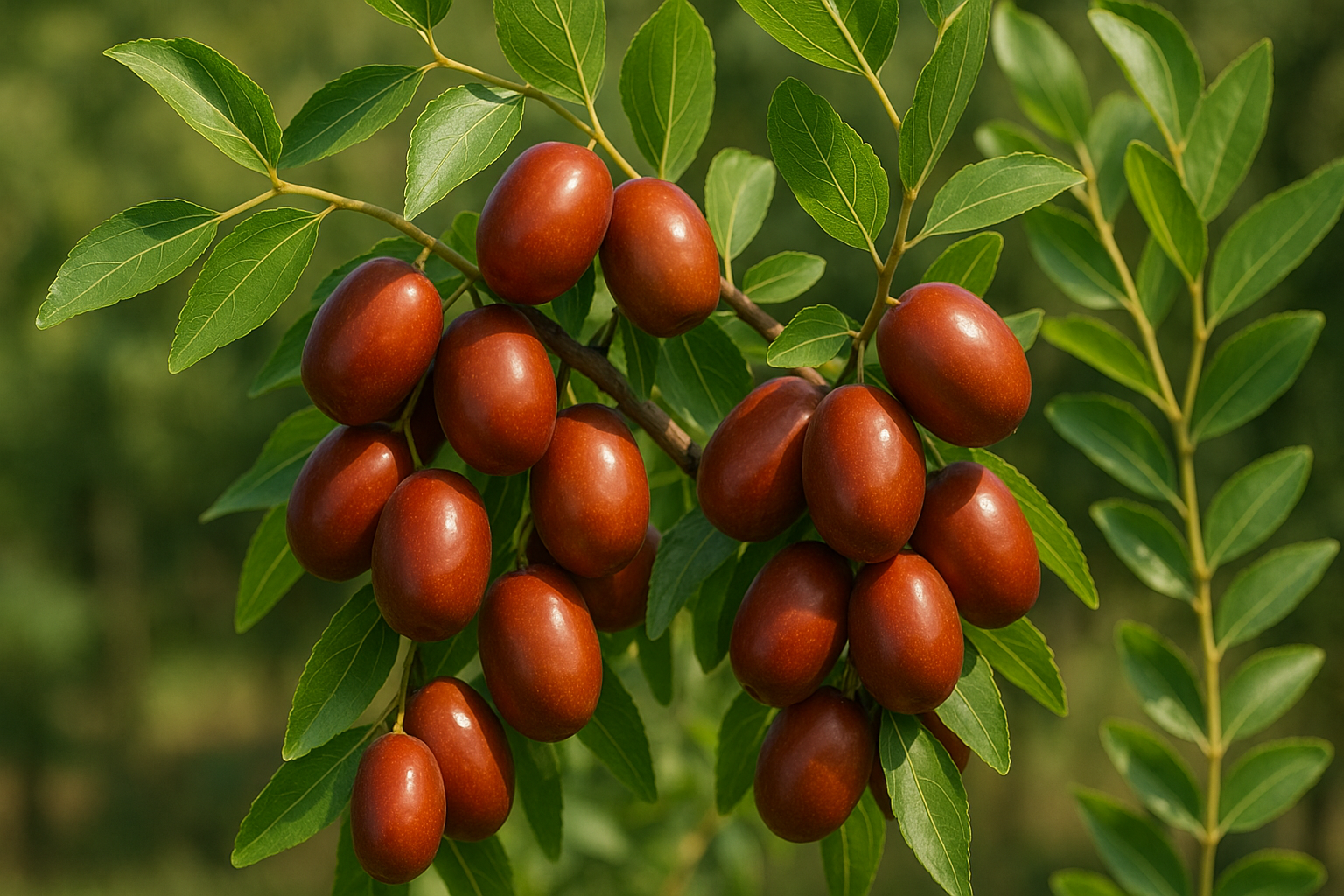Introduction: Meet Žižole, the Rising Superfruit
When you hear Žižole, you might not immediately recognise the name — but this small, ancient fruit (better known in many parts of the world as jujube or “Chinese date”) is quietly gaining recognition as a superfruit powerhouse. Native to Asia and long cultivated in Mediterranean and Balkan climates, žižole has a blend of nutritional strength, traditional medicinal uses, and culinary versatility that makes it a compelling addition to modern health and wellness routines.
What Exactly Is Žižole?
Žižole (pronounced “zhee-zhole”) refers to the fruit of the Ziziphus jujuba tree, part of the buckthorn family. Over centuries, it spread from China through Central Asia, the Middle East, the Mediterranean, and into parts of Europe. Fresh, it has a crisp texture reminiscent of an apple; when dried, it becomes chewy and sweet like a date. In Balkan regions, it’s sometimes called Žižule and is used in preserves, syrups, or even spirits. The tree is hardy, drought-resistant, and relatively low-maintenance.
Nutritional Profile: Small Fruit, Big Impact
Despite its modest size, Žižole packs a robust nutritional punch. A 100-gram serving of fresh fruit typically offers:
- Calories: ~79 kcal
- Fibre: a significant amount to support digestion
- Vitamin C: abundant, often exceeding many common fruits
- Potassium, calcium, iron, magnesium, and trace B vitamins
- Antioxidant compounds: flavonoids, phenolics, polysaccharides
Because dried žižole concentrates contain sugars and nutrients, their caloric and sugar content is higher per weight, so portions matter.
Health Benefits: What Science and Tradition Say
1. Immune Support & Antioxidant Power
The high vitamin C and antioxidant compounds help neutralise free radicals, bolster the immune system, and reduce oxidative stress. Studies and traditional use alike indicate that this fruit offers protection against various inflammatory processes.
2. Promoting Sleep, Reducing Anxiety
In traditional Chinese medicine and herbal systems, žižole is prized for its calming or sedative qualities. Animal and cell studies indicate that certain compounds in jujube may modulate neurotransmitters to promote restfulness and reduce stress.
3. Digestive Health & Gut Regularity
Its fibre content aids in bowel movements, supports gut health, and may soothe gastrointestinal irritation. Traditional formulas often include jujube for this reason.
4. Heart & Metabolic Support
Žižole may help regulate cholesterol, triglycerides, and blood sugar levels, thanks to bioactive compounds that improve insulin sensitivity and lipid metabolism.
5. Skin Health & Anti-Ageing
Antioxidants in žižole help combat oxidative damage in the skin and tissues, supporting collagen integrity and slowing the signs of ageing. These protective benefits are often cited in wellness circles.
6. Anti-Inflammatory & Cellular Protection
Various studies (especially on wild jujube species) attribute anti-inflammatory, neuroprotective, and even anticancer potentials to extracts, though human clinical confirmation is still limited.
How to Use Žižole: Culinary, Herbal & Daily Tips
Fresh Consumption
Pick ripe žižole (reddish or brown) and eat them like apples. Remove the pit. Its crisp, sweet flavour makes it a refreshing snack or a great addition to salads.
Dried & Chewy
Dried žižole are sweet and chewy. Use them in trail mixes, baked goods, jams, or as natural sweeteners in desserts or granola.
Teas & Infusions
Simmer dried slices in hot water to make a calming herbal tea. Often paired with herbs like ginger or chamomile for added benefits.
Incorporation into Recipes
Think beyond snacks: toss žižole into stews, braises, rice dishes, or dessert compotes. In Balkan and Mediterranean cuisine, they’re used in jams, syrups, and even fermented drinks.
Supplement Forms
You’ll also find powdered jujube or extracts marketed for sleep, immune support, or skin health—but quality and concentrations vary. Use caution and verify labels.
Growing Žižole: A Garden-Friendly Superfruit
One delight of žižole is that it’s accessible to gardeners. The tree thrives in sunny, relatively dry climates, tolerates poorer soils, and is drought-resistant once established.
Plant in well-drained soil, give full sunlight, and expect fruit in a few years. Pruning helps maintain shape and promote airflow. The harvest season typically occurs from late summer to early fall. For regions with colder winters, young plants may need protection or containment.
Risks, Side Effects & Precautions
- Drug interactions: Some compounds in jujube may interact with certain anti-seizure medications and antidepressants. Always consult a healthcare provider if you are taking any of these medications.
- Overconsumption: Because dried žižole are sugar-concentrated, excessive intake may impact blood sugar or digestion.
- Allergic sensitivity: Rarely, people may have allergic reactions or sensitivities to components in the fruit.
- Pregnancy & health conditions: Studies in humans are limited — pregnant or nursing individuals should seek medical guidance before using concentrated extracts.
Žižole in Culture, Tradition & Modern Trends
Historically, žižole has held symbolic and medicinal importance in Chinese, Persian, and Balkan traditions. In China, it has been used in tonics to promote vitality and longevity. In the Balkans, it’s part of home preserves, jams, and even rakija (fruit brandy) traditions.
More recently, Žižole is re-emerging in wellness, superfood, and functional food circles. You’ll see it in wellness blogs, Instagram recipes, boutique dried-fruit blends, and supplement formulations. Its historical legacy, combined with real nutritional backing, makes it a compelling “rediscovered” superfruit.
How to Incorporate Žižole into Daily Routine
- Snack smart: Replace processed sweets with a few dried žižole after lunch
- Morning boost: Slice fresh fruit into yoghurt or oatmeal
- Evening tea: Brew a handful of dried pieces with warm water or an herbal mix
- Smoothies & shakes: Blend dried or fresh žižole with fruit, greens, and plant milk.
- Cook creatively: Use in stews, baked goods, compotes, or energy bars.
Start small, observe how your body responds, and enjoy it consistently to explore benefits.
Why Žižole Deserves a Spot in Your Wellness Arsenal
Žižole’s appeal lies in its combination of tradition, nutritional strength, gentle bioactivity, and flavour versatility. It bridges ancient herbal wisdom with modern dietary trends. For those seeking natural, minimally processed foods with potential health benefits, Žižole is a standout contender.
It supports immunity, gut health, rest, skin vitality, and metabolic balance — all wrapped in a small, delicious fruit. Add to that its relative ease of cultivation and long cultural legacy, and it’s easy to see why it is gaining momentum among health-conscious eaters.
Final Thoughts: Embrace the Power of Žižole
Žižole is not just a niche fruit; it serves as a bridge between traditional herbal knowledge and contemporary superfood movements. Whether eaten fresh or dried, brewed in tea, or added to your recipes, it offers real nutritional value and time-honoured benefits.
As research continues to deepen our understanding, jujube (Žižole) stands poised to transform more than just your taste buds — it may become a pillar of your natural wellness toolkit. Give it a try, listen to your body, and celebrate how a small red fruit can deliver significant benefits.




